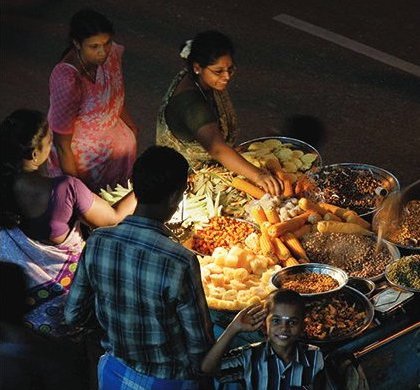
Mr Ganesan’s Grief
Three days had passed since the death of Mr Ganesan’s wife, and the neighbourhood was worried because Mr Ganesan had not yet shed a single tear for her. I was ten years old at the time, and since I had never seen any signs of affection between Mr Ganesan and his wife, I didn’t understand why people were expecting him to be sad that she was gone.
‘I can’t bear to see him bottle up his emotions like this,’ my mother said to my father.
Some of his friends decided to pay him a visit. My parents were among them, as was Colonel Das and his wife, and even Dr Damodar, brand new to the neighbourhood but as concerned as everyone else about Mr Ganesan. Curious to see what was going to happen, I went along.
Though our visit was unannounced, Mr Ganesan welcomed us in. We sat in silence for a few minutes.
‘Will you have tea?’ Mr Ganesan said finally, to no one in particular.
‘Mr Ganesan, please read this,’ said Dr Damodar, handing him a book.
‘Why God Why? How To Cope With the Loss of a Loved One,’ said Mr Ganesan, reading from the cover of the book.
‘Read it. It’ll help you,’ said Dr Damodar.
‘Thank you,’ said Mr Ganesan, ‘Tea?’
‘She was such a wonderful human being,’ said my mother.
‘Yes,’ said Mr Ganesan.
‘Our son wouldn’t have passed his exams if it hadn’t been for her help,’ said Colonel Das, his voice choking up.
‘She knew we both have jobs,’ said my father, ‘So she regularly sent food over to our house.’
‘She was like a mother to us,’ said my mother.
Colonel Das was the first to cry. His expression slowly wilted and small sobs welled up in his chest. Then he pulled out his handkerchief and began to sniffle gently into it. His wife was soon sobbing along with him. My mother was next, burying her face in her hands, and as my father placed a steadying hand on her back, tears began to trickle down his cheeks as well. Dr Damodar was the last to cry, but when he did it was a sudden, helpless bawling. The only people who remained dry-eyed in the room were me and Mr Ganesan.
Gradually, over the next few weeks, the neighbourhood gave up waiting for Mr Ganesan to cry. Some, like my mother, believed that by denying himself his grief he would drive himself mad. Others believed that the reason he hadn’t cried was that he had never cared for his wife in the first place.
A few years later Mr Ganesan decided to move out of his house.
‘He’s all alone. It would be better if he stayed,’ my father said to my mother, ‘He needs to be around familiar faces.’
But soon Mr Ganesan was gone. The new tenants found that he had left the house almost intact, and that there was no space for the furniture they had brought with them.
When they gave away his things, I got the sturdy wooden desk from his old study. In the bottom drawer I found a black and white photograph, blotchy with age, of a young Mr Ganesan and his new bride. I still have the photograph with me. Her head is thrown slightly back and her eyes are crinkled with laughter. He, on the other hand, stands ramrod straight, staring blankly ahead, offering no clues about himself to the camera.
